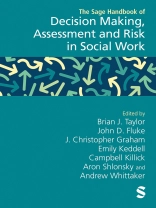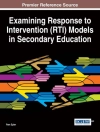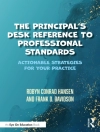The SAGE Handbook on Decision Making, Assessment and Risk in Social Work provides a comprehensive overview of key strands of research and theoretical concepts in this increasingly important field.
With 49 chapters and four section summaries, this Handbook describes the ‘state of the art’; discuss key debates and issues; and gives pointers on future directions for practice, research, teaching, management of services, and development of theoretical understandings.
A key aim of this Handbook is to support the development of sound, applied knowledge and values to underpin reasoned professional judgement and decision making by social workers in practice and those in management and regulatory roles.
With contributions from a global interdisciplinary body of leading and emerging scholars from a wide variety of roles, this handbook has been designed to be internationally generalisable and applicable to all major areas of social work.
This Handbook provides a field-defining account of decision making, assessment and risk in social work which is unrivalled for its diversity and strength of coverage, and will be of value to social work researchers, teachers and practitioners, as well as to those in allied fields such as health care.
Section 1: Professional Judgement
Section 2: Assessment, Risk and Decision Processes
Section 3: Assessment Tools and Approaches
Section 4: Developing and Managing Practice
Section 5: Concluding Section / Afterword
Зміст
Foreword – Annamaria Campanini
Introduction to the Handbook – Brian J Taylor
Section 1: Professional Judgement
Introduction to Section One – Emily Keddell & Aron Shlonsky
Sub-section A: Heuristics& Biases
Chapter 1: Confirmation bias in social work – Trevor Spratt
Chapter 2. Blame & emotion in professional judgement – Alessandro Sicora
Chapter 3: The influence of optimism on analysis in professional judgement – Martin Kettle
Chapter 4: Heuristics in professional judgement: between proximity & distance – Jacob Magnussen & Annemette Matthiesen
Sub-section B: Professional Judgment in Context
Chapter 5: Collective cultures, risk, and individual judgement – Tracie Mafile’o, Jean Mitaera & Halaevalu Vakalahi
Chapter 6: Social & relational contexts of professional judgement in organisations – David Hodgson, Lynelle Watts & Donna Chung
Sub-section C: Knowledge Use in Judgement Processes
Chapter 7: . Intuition in social work practice – Laura Cook
Chapter 8: Challenges to using knowledge (evidence) in professional judgement – Paul Mc Cafferty
Chapter 9: Critical thinking and professional judgement – Eileen Gambrill
Sub-section D: Discretion & Reasoning
Chapter 10: Sense making in professional judgement – Duncan Helm
Chapter 11: Theories of professional judgement – Christian Ghanem & Joel Gautschi
Sub-section E: Prospects & Developments
Chapter 12: Methods for studying professional judgement in social work – Joel Gautschi & Christian Ghanem
Section 2: Assessment, Risk and Decision Process
Introduction to Section Two – Campbell Killick
Sub-section A: Contextual Aspects of Decision Making and Working with Risk
Chapter 13: Cultural aspects of assessment and decision-making processes – Prospera Tedam
Chapter 14: Legally-literate decision making and management of risk in social work – Michael Preston-Shoot
Chapter 15: Interprofessional decision making – Ravit Alfandari, Jaroslaw Przeperski & Brian J Taylor
Chapter 16: Decision making in organisational contexts – Mark Gregory
Chapter 17: Assessment and risk: recognising the circularity of child-adverse-events and psychiatric disorders in children and adults – Colin Pritchard & Richard Williams
Sub-section B: Engaging Children and Families in Assessment and Decision Processes
Chapter 18: Engaging client families in assessment and managing risks – Lorna Montgomery, Mandi Mac Donald & Eddy J Walakira
Chapter 19: Engaging children in assessment and decisions – Janne Fengler & Peter Schäfer
Chapter 20: Reimagining participation of young people in decision making in contexts of vulnerability – Mónica López López, Leo Wieldraaiher-Vincent & Mijntje ten Brummelaar
Sub-section C: Engaging Adults in Assessment and Decision Processes
Chapter 21: Engaging adults in the assessment – Gavin Davidson, Katherine Greer, Aodán Mulholland & Paul Webb
Chapter 22: Shared decision making with clients – Anna Olaison & Sarah Donnelly
Chapter 23: Decisional capacity in mental health social work – Jim Campbell & Ross Campbell
Chapter 24: Risk, desistance and engagement: working with adult service users in Probation – Hazel Kemshall
Sub-section D: Prospects & Developments
Chapter 25: Studying risk-managing, decision-making & assessment processes – Campbell Killick & Brian J Taylor
Section 3: Assessment Tools and Approaches
Introduction to Section Three – John D Fluke & J Christopher Graham
Sub-section A: Foundations of Assessment Tools & Predicting Harm
Chapter 26: Foundations of valid assessment – J Christopher Graham & John D Fluke
Chapter 27: From validity to validation and beyond – J Christopher Graham & Doug Klinman
Chapter 28: Standardized risk assessment tools: methods, development & applications – Julie L Crouch & Joel S Milner
Sub-section B: Assessment and the Use of Tools
Chapter 29: Implementing assessments using structured tools – Kresta M Sørensen
Chapter 30: Decision aids, decision supports and managing risk – Pascal Bastian & Mark Schrödter
Chapter 31: Legal aspects of decision-making processes in social work – Donald C Bross & Henry Plum
Chapter 32: Data visualization as an assessment tool – Kelly G Stepura
Sub-section C: Approaches to Assessment
Chapter 33: Big data analytics for making decisions and managing risk – Beth Coulthard & Brian J Taylor
Chapter 34: The devil in the detail: algorithmic risk prediction tools and their implications for ethics, justice and decision making – Emily Keddell
Chapter 35: Natural language processing: opportunities and challenges – Beth Coulthard
Chapter 36: Understanding risk through social epidemiology – Emmaline Houston, Barbara Fallon & John D Fluke
Section 4: Developing and Managing Practice
Introduction to Section Four – Andrew Whittaker
Sub-section A: Learning & Teaching Decision Making
Chapter 37: Complexity and troublesome knowledge: teaching decision-making in social work – David Saltiel
Chapter 38: Improving high-risk decision-making in situations of risk and uncertainty: the role of deliberate attention – Cheryl Regehr
Sub-section B: Continuing Professional Development
Chapter 39: Developing professional expertise: transitions and thresholds in complex organisational contexts – Louise O’Connor & Kate Leonard
Chapter 40: The contribution of reflective practice to developing professional judgement and decision-making knowledge and skills – Danielle Turney & Gillian Ruch
Chapter 41: Supervising professional judgement – David Wilkins
Sub-section C: Contextual & Organisational Aspects
Chapter 42: Accountability for risk decision-making in social care – David Carson & Judith Mullineux
Chapter 43: Getting evidence into organisations to support decision making and risk work – Anne Mc Glade
Chapter 44: Accountability, management & professional discretion – Jochen Devlieghere & Rudi Roose
Sub-section D: Managing Services in a Risk Context
Chapter 45: Managing risk and decision-making processes – Denise Harvey & Arlene P Weekes
Chapter 46: Regulating risk in care services – Mary Mc Colgan, Suzanne Cunnningham, James Laverty & Insa Osterhus
Chapter 47: Risk and regulation of the social care workforce – Marian O’Rourke, Helen Mc Vicker & Catherine Maguire
Sub-section E: Prospects & Developments
Chapter 48: Studying the effectiveness of interventions to improve decision making and work with risk – Joanne Hilder & Andrew Whittaker
Section 5: Concluding Section / Afterword
Chapter 49: Challenges in less developed welfare systems and professional contexts – Janet Ananias, Rajendra Baikady & Vivian Lou
Glossary
Про автора
Andrew Whittaker, Ph D, is Professor of Social Work Research at London South Bank University, England, where he is head of the Risk Resilience and Expert Decision Making (RRED) research group. His research on risk and decision making has ranged from ethnographic to randomised controlled trial research designs. Andrew recently completed a review of professional decision making for a child death inquiry in Queensland, Australia. He is the Convenor of the Decisions, Assessment and Risk Special Interest Group (DARSIG) of the European Social Work Research Association. DARSIG is the main European network for researchers in the field of assessment, risk and decision making in social work, with more than 80 members in over 20 countries. Andrew is Editor of the Journal of Social Work Practice.












